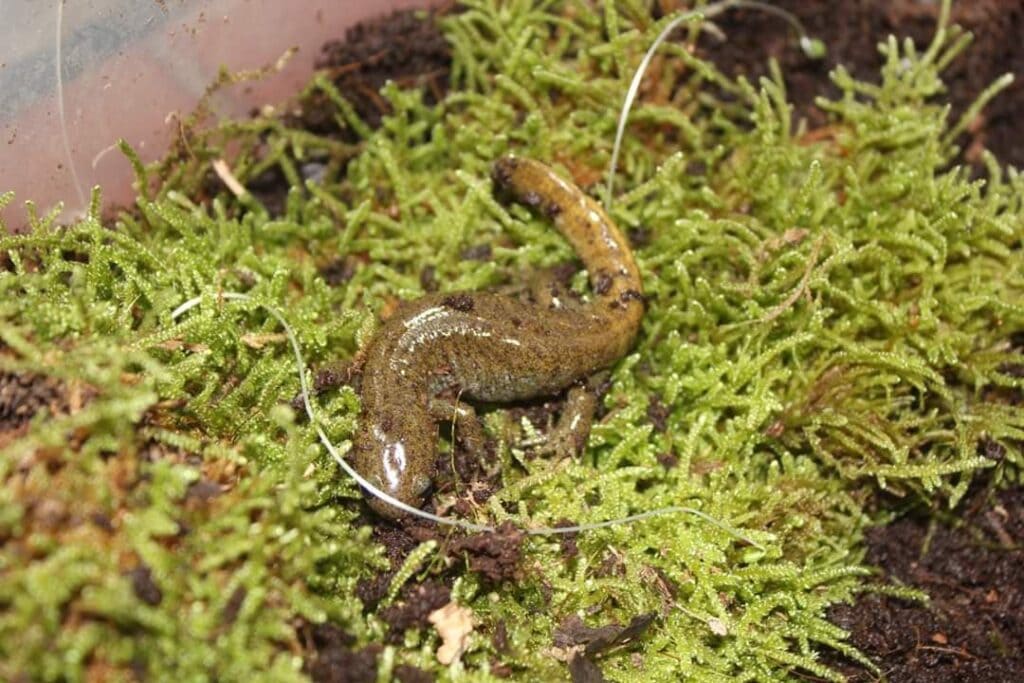Hynobiidae

The family Hynobiidae is the sister taxon of the family Cryptobranchidae, meaning that they are the closest living relatives to the Cryptobranchidae. The two families form the suborder Cryptobranchoidea and are often called primitive salamanders. They share these three synapomorphies links:
- Fusion of first hypobranchials and first ceratobranchials
- Fusion of tibialis muscles
- Eggs enclosed in paired sacs
This family likely originated in the Middle Cretaceous in what is today northern China and is thought to be the closest animals resembling the ancestor of modern salamanders. The family is formed by 69 species distributed among 9 genus and 2 subfamilies:
- Hynobiinae: formed by all genus but the Onychodactylus
- Onychodactyliini: formed by the genus Onychodactylus
This family is commonly referred as the “Asian Salamanders”, and it is the only family which geographical distribution is limited to the Asia (with one specie entering European Russia), with the only other Asian Salamanders being the genus Andrias and some Salamandridae.
Despite being related to the members of the family Cryptobranchidae, the Hynobiidae do not resemble the members of that family. The Hynobiidae are small, with no species larger than 25cm, and most being under 10cm in length. The vast majority of species exhibits a full metamorphosis, returning to the water just for reproduction, even though there are some species, like the members of the Onychodactylus, Batrachuperus, Liua, and Pachyhynobius genera, which remain aquatic.
The Hynobiidae have eyelids, hind limbs with four or five toes, and both the lacrimal and septomaxillae bones in their skulls, which are absent in the Cryptobranchids. Some species do not have the operculum and opercularis muscle, a characteristic that they share only with the salamanders of the Rhyacotriton family. All genera have lungs, apart from the Onychodactylus which are lungless, and the Ranodon, which have reduced lungs.
Members of the genus Onychodactylus, Liua shihi, and some Batrachuperus all have claws or horny covers on their hands giving them the name of clawed salamanders. This is an adaptation to their habitat where the claws allow them to grasp onto slippery rocks in their fast stream habitats.
Another unique characteristic of this family is their breeding habits. The Hynobiidae practice external fertilisation, or spawning, where the females lays two arc-shaped, gelatinous egg sacs, each containing up to 70 eggs, and attaches them to stones or vegetation, for the males to fertilise. Parental care, in the form of egg guarding, has also been observed in various species.
Larvae of various species, such as the Hynobius retardatus have displayed the development of cannibalistic morphology. Larvae displaying this morphology have wider heads, which allows them to more easily eat salamanders and frogs larvae.
Species List
Subfamily Hynobiinae (59 species)
Genus Batrachuperus (6 species)
Batrachuperus karlschmidti
Batrachuperus londongensis
Batrachuperus pinchonii
Batrachuperus taibaiensis
Batrachuperus tibetanus
Batrachuperus yenyuanensis
Genus Hynobius (39 species)
Hynobius abei
Hynobius amakusaensis
Hynobius amjiensis
Hynobius arisanensis
Hynobius boulengeri
Hynobius chinensis
Hynobius dunni
Hynobius formosanus
Hynobius fossigenus
Hynobius fucus
Hynobius glacialis
Hynobius guabangshanensis
Hynobius hidamontanus
Hynobius hirosei
Hynobius ikioi
Hynobius katoi
Hynobius kimurae
Hynobius leechii
Hynobius lichenatus
Hynobius maoershanensis
Hynobius mikawaensis
Hynobius naevius
Hynobius nebulosus
Hynobius nigrescens
Hynobius okiensis
Hynobius osumiensis
Hynobius quelpaertensis
Hynobius retardatus
Hynobius shinichisatoi
Hynobius sonani
Hynobius stejnegeri
Hynobius takedai
Hynobius tokyoensis
Hynobius tosashimizuensis
Hynobius tsuensis
Hynobius turkestanicus
Hynobius unisacculus
Hynobius yangi
Hynobius yiwuensis
Genus Liua (2 species)
Liua tsinpaensis
Genus Pachyhynobius (1 species)
Genus Paradactylodon (2 species)
Paradactylodon persicus
Genus Pseudohynobius (6 species)
Pseudohynobius flavomaculatus
Pseudohynobius guizhouensis
Pseudohynobius jinfo
Pseudohynobius kuankuoshuiensis
Pseudohynobius puxiongensis
Pseudohynobius shuichengensis
Genus Ranodon (1 species)
Genus Salamandrella (2 species)
Salamandrella keyserlingii
Salamandrella tridactyla
Subfamily Onychodactylinae (10 species)
Genus Onychodactylus (10 species)
Onychodactylus fischeri
Onychodactylus fuscus
Onychodactylus intermedius
Onychodactylus japonicus
Onychodactylus kinneburi
Onychodactylus koreanus
Onychodactylus nipponoborealis
Onychodactylus tsukubaensis
Onychodactylus zhangyapingi
Onychodactylus zhaoermii
References
Citation: Larson, Allan, David Wake, and Tom Devitt. 2006. Hynobiidae. Version 05 September 2006 (under construction). http://tolweb.org/Hynobiidae/15453/2006.09.05 in The Tree of Life Web Project, http://tolweb.org/
Citation: AmphibiaWeb: Information on amphibian biology and conservation. [web application]. 2018. Berkeley, California: AmphibiaWeb. Available: https://amphibiaweb.org/. (Accessed: 2018).